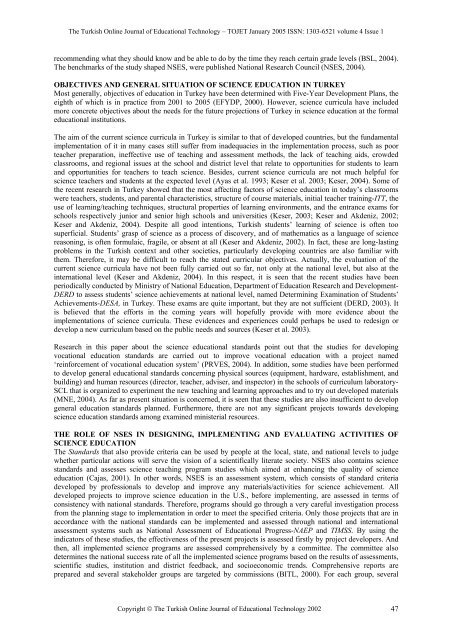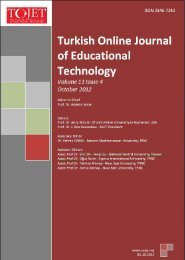Age - TOJET the Turkish online journal of educational technology
Age - TOJET the Turkish online journal of educational technology
Age - TOJET the Turkish online journal of educational technology
Create successful ePaper yourself
Turn your PDF publications into a flip-book with our unique Google optimized e-Paper software.
The <strong>Turkish</strong> Online Journal <strong>of</strong> Educational Technology – <strong>TOJET</strong> January 2005 ISSN: 1303-6521 volume 4 Issue 1<br />
recommending what <strong>the</strong>y should know and be able to do by <strong>the</strong> time <strong>the</strong>y reach certain grade levels (BSL, 2004).<br />
The benchmarks <strong>of</strong> <strong>the</strong> study shaped NSES, were published National Research Council (NSES, 2004).<br />
OBJECTIVES AND GENERAL SITUATION OF SCIENCE EDUCATION IN TURKEY<br />
Most generally, objectives <strong>of</strong> education in Turkey have been determined with Five-Year Development Plans, <strong>the</strong><br />
eighth <strong>of</strong> which is in practice from 2001 to 2005 (EFYDP, 2000). However, science curricula have included<br />
more concrete objectives about <strong>the</strong> needs for <strong>the</strong> future projections <strong>of</strong> Turkey in science education at <strong>the</strong> formal<br />
<strong>educational</strong> institutions.<br />
The aim <strong>of</strong> <strong>the</strong> current science curricula in Turkey is similar to that <strong>of</strong> developed countries, but <strong>the</strong> fundamental<br />
implementation <strong>of</strong> it in many cases still suffer from inadequacies in <strong>the</strong> implementation process, such as poor<br />
teacher preparation, ineffective use <strong>of</strong> teaching and assessment methods, <strong>the</strong> lack <strong>of</strong> teaching aids, crowded<br />
classrooms, and regional issues at <strong>the</strong> school and district level that relate to opportunities for students to learn<br />
and opportunities for teachers to teach science. Besides, current science curricula are not much helpful for<br />
science teachers and students at <strong>the</strong> expected level (Ayas et al. 1993; Keser et al. 2003; Keser, 2004). Some <strong>of</strong><br />
<strong>the</strong> recent research in Turkey showed that <strong>the</strong> most affecting factors <strong>of</strong> science education in today’s classrooms<br />
were teachers, students, and parental characteristics, structure <strong>of</strong> course materials, initial teacher training-ITT, <strong>the</strong><br />
use <strong>of</strong> learning/teaching techniques, structural properties <strong>of</strong> learning environments, and <strong>the</strong> entrance exams for<br />
schools respectively junior and senior high schools and universities (Keser, 2003; Keser and Akdeniz, 2002;<br />
Keser and Akdeniz, 2004). Despite all good intentions, <strong>Turkish</strong> students’ learning <strong>of</strong> science is <strong>of</strong>ten too<br />
superficial. Students’ grasp <strong>of</strong> science as a process <strong>of</strong> discovery, and <strong>of</strong> ma<strong>the</strong>matics as a language <strong>of</strong> science<br />
reasoning, is <strong>of</strong>ten formulaic, fragile, or absent at all (Keser and Akdeniz, 2002). In fact, <strong>the</strong>se are long-lasting<br />
problems in <strong>the</strong> <strong>Turkish</strong> context and o<strong>the</strong>r societies, particularly developing countries are also familiar with<br />
<strong>the</strong>m. Therefore, it may be difficult to reach <strong>the</strong> stated curricular objectives. Actually, <strong>the</strong> evaluation <strong>of</strong> <strong>the</strong><br />
current science curricula have not been fully carried out so far, not only at <strong>the</strong> national level, but also at <strong>the</strong><br />
international level (Keser and Akdeniz, 2004). In this respect, it is seen that <strong>the</strong> recent studies have been<br />
periodically conducted by Ministry <strong>of</strong> National Education, Department <strong>of</strong> Education Research and Development-<br />
DERD to assess students’ science achievements at national level, named Determining Examination <strong>of</strong> Students’<br />
Achievements-DESA, in Turkey. These exams are quite important, but <strong>the</strong>y are not sufficient (DERD, 2003). It<br />
is believed that <strong>the</strong> efforts in <strong>the</strong> coming years will hopefully provide with more evidence about <strong>the</strong><br />
implementations <strong>of</strong> science curricula. These evidences and experiences could perhaps be used to redesign or<br />
develop a new curriculum based on <strong>the</strong> public needs and sources (Keser et al. 2003).<br />
Research in this paper about <strong>the</strong> science <strong>educational</strong> standards point out that <strong>the</strong> studies for developing<br />
vocational education standards are carried out to improve vocational education with a project named<br />
‘reinforcement <strong>of</strong> vocational education system’ (PRVES, 2004). In addition, some studies have been performed<br />
to develop general <strong>educational</strong> standards concerning physical sources (equipment, hardware, establishment, and<br />
building) and human resources (director, teacher, adviser, and inspector) in <strong>the</strong> schools <strong>of</strong> curriculum laboratory-<br />
SCL that is organized to experiment <strong>the</strong> new teaching and learning approaches and to try out developed materials<br />
(MNE, 2004). As far as present situation is concerned, it is seen that <strong>the</strong>se studies are also insufficient to develop<br />
general education standards planned. Fur<strong>the</strong>rmore, <strong>the</strong>re are not any significant projects towards developing<br />
science education standards among examined ministerial resources.<br />
THE ROLE OF NSES IN DESIGNING, IMPLEMENTING AND EVALUATING ACTIVITIES OF<br />
SCIENCE EDUCATION<br />
The Standards that also provide criteria can be used by people at <strong>the</strong> local, state, and national levels to judge<br />
whe<strong>the</strong>r particular actions will serve <strong>the</strong> vision <strong>of</strong> a scientifically literate society. NSES also contains science<br />
standards and assesses science teaching program studies which aimed at enhancing <strong>the</strong> quality <strong>of</strong> science<br />
education (Cajas, 2001). In o<strong>the</strong>r words, NSES is an assessment system, which consists <strong>of</strong> standard criteria<br />
developed by pr<strong>of</strong>essionals to develop and improve any materials/activities for science achievement. All<br />
developed projects to improve science education in <strong>the</strong> U.S., before implementing, are assessed in terms <strong>of</strong><br />
consistency with national standards. Therefore, programs should go through a very careful investigation process<br />
from <strong>the</strong> planning stage to implementation in order to meet <strong>the</strong> specified criteria. Only those projects that are in<br />
accordance with <strong>the</strong> national standards can be implemented and assessed through national and international<br />
assessment systems such as National Assessment <strong>of</strong> Educational Progress-NAEP and TIMSS. By using <strong>the</strong><br />
indicators <strong>of</strong> <strong>the</strong>se studies, <strong>the</strong> effectiveness <strong>of</strong> <strong>the</strong> present projects is assessed firstly by project developers. And<br />
<strong>the</strong>n, all implemented science programs are assessed comprehensively by a committee. The committee also<br />
determines <strong>the</strong> national success rate <strong>of</strong> all <strong>the</strong> implemented science programs based on <strong>the</strong> results <strong>of</strong> assessments,<br />
scientific studies, institution and district feedback, and socioeconomic trends. Comprehensive reports are<br />
prepared and several stakeholder groups are targeted by commissions (BITL, 2000). For each group, several<br />
Copyright © The <strong>Turkish</strong> Online Journal <strong>of</strong> Educational Technology 2002 47
















